Flying Insects
Fabric Pests
Rodents
Crawling Insects
Spiders
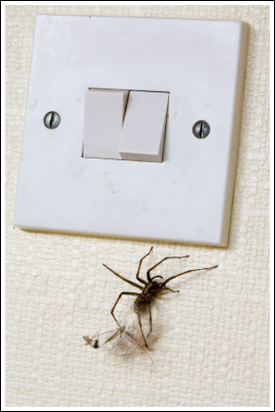 Pest-Gone, LLC your NJ pest control exterminator is trained to both federal and state standards in providing you an effective approach to spider control and spider exterminating in NJ to either your home or business, using the most eco-friendly methods available for spider control and spider exterminating in NJ. When it comes to effective spider removal in NJ trust in a locally based pest control company in New Jersey with over two decades of experince and settles for nothing less than 100% customer satisfaction.
Pest-Gone, LLC your NJ pest control exterminator is trained to both federal and state standards in providing you an effective approach to spider control and spider exterminating in NJ to either your home or business, using the most eco-friendly methods available for spider control and spider exterminating in NJ. When it comes to effective spider removal in NJ trust in a locally based pest control company in New Jersey with over two decades of experince and settles for nothing less than 100% customer satisfaction.
When we come out to your home we will do a thorough inspection prior to treatment and help point out any spider control problems within your home. Many times treating ones home from the outside can help eliminate spiders from the inside helping you have more success for permanent spider removal from inside your home. Pest-Gone, LLC also offers a year round protection plan which covers you for spider control and exterminating year-round allowing you peace of mind all year. So don't hesitate and let the top exterminators in NJ take care of your spider pest control problem today!
Call Pest-Gone, LLC NJ Pest Control to speak to a Spider Control Professional today at 732-356-0024
“We Always Guarantee our Work”
Please read below to learn more about spider control and spider extermination in NJ:
Spiders are generally categorized as either web spinners or hunters depending on how they catch their prey. Hunting spiders wander around searching for their prey or hunt by laying in ambush. The more insects there are inside a building, the more likely it is to have spiders living there. Spiders also like to find refuge in warmer buildings as the nights cool off in the fall.
All spiders are carnivorous and with few exceptions have poison glands. They have spinarets used for making webs to snare their prey, but some actually roam around hunting for victims. Webs may be used to make homes, lacing leaves or grass together, and they also may be used to bind their catch.
The Jumping Spider attaches a strand just before jumping-a type of lifeline so as not to jump too far into a place where it may have difficulty in getting out. Eggs are encased in webbing, usually in a sac, which is then hidden under bark or rocks, kept in a nest, fastened in the snare web, or carried around (like the Wolf Spider). Some never even see their offspring, some protect the eggs until they hatch, and the Wolf Spider even carries the young around until they can hunt on their own. Spiders feed by removing the internal liquid contents of their prey with their Chelicera (fangs).
Ticks & Fleas
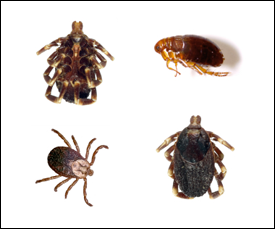 Flea pest control and flea removal services in NJ can be a real problem. Once fleas have entered your home, it can be a very lengthy removal process. Pest-Gone, LLC technicians are highly trained for flea pest control services in NJ. As your flea pest control exterminators in NJ, we provide a thorough inspection and flea removal services for the interior and exterior of your home.
Flea pest control and flea removal services in NJ can be a real problem. Once fleas have entered your home, it can be a very lengthy removal process. Pest-Gone, LLC technicians are highly trained for flea pest control services in NJ. As your flea pest control exterminators in NJ, we provide a thorough inspection and flea removal services for the interior and exterior of your home.
Fleas can enter your home in many ways, even if your pet is not or rarely goes outside. They can hop in from your yard, hitch a ride on you, or even be left over from previous inhabitants. Flea eggs can be found on your pet and wherever your pets spend time. It is vital to call your local flea control service in NJ to prevent a flea problem turning into a flea infestation which could happen in the matter of days. If you suspect fleas have invaded your home, don't hesitate! Call Pest-Gone, LLC your flea pest control exterminators of NJ and speak to one of our highly trained flea control and flea removal consultants today.
Call Pest-Gone, LLC NJ Pest Control to speak to a Tick and Flea Control Professional today at 732-356-0024
“We Always Guarantee our Work”
Please read below to learn more about Ticks and Fleas:
Ticks are in the phylum of animals called Arthropoda (jointed appendage). This phylum of animals is the largest in the animal kingdom. There are over 850 different species of ticks, and they parasitize every class of terrestrial vertebrate animal, including amphibians.
Ticks are small rounded arachnids that cling to one spot and do not move. They have inserted their head under the skin and are engorging themselves on the blood. Diseases carried by ticks means that you should have yourself or your pets checked after you find ticks. On the one hand, ticks are a little easier to deal with since they remain outdoors, and do not infest houses the way fleas do; on the other hand, they carry more dangerous diseases and are harder to find.
Ticks don't typically infest houses, unless you have a pet that had an overlooked tick that dropped off and hatched its eggs. In the Northeast US and other temperate climates the tick Rhipicephalus sanguineus is almost exclusively limited to domestic habitats, particularly kennels. Becasue the entire life cycle occurs inside, control strategies become similar to that of controlling fleas. You will have to spray your house in this case as ticks hatch an unbelievable number of eggs. Your local hardware store can give you tips on what is best to spray with. You are not too likely to find "natural" or low-toxic sprays for ticks. On the other hand, one spraying is likely all you need to clear them out of your house. They are not tenacious the way fleas are.
Fleas can enter the home in many ways, even if your pet is not or only rarely allowed outside. They can hop in from your yard, hitch a ride on you, or even be left over from previous inhabitants (larvae can remain dormant for astonishingly long periods of time under a variety of conditions).
Conventional wisdom and older studies that studied rat fleas suggest that fleas spend only part of their time on your pet; this is not true. There are different varieties of fleas, and the primary flea infesting dogs and cats in North America and large areas of Europeis the cat flea (yes on dogs, too). This flee, not as well studied as the rat flea actually spends all of its adult life on the host under normal conditions. Eggs are laid on the host and drop off into the environment. Thus you can often find eggs wherever your pets spend time: on their bedding, through the house, in the backyard.
A good preventive method is to put down towels everywhere your pet normally lies and then wash those towels once a week. Deposited flea eggs are therefore cleaned out regularly. Regular vacuuming and emptying of the vacuum bag also helps, independently of any method or methods you choose to do, since that eliminates or reduces food sources for the larvae
Bed Bugs
BED BUGS
Pest-Gone, LLC is one of the leading pest control and bed bug control companies in NJ providing you with eco-friendly bed bugs extermination and bed bug removal services.
With over 20 years of bed bug pest control experience in NJ, Pest-Gone, LLC has compiled a list of the best practices and solutions to fully clear you of your bed bug problem with a 100% success rate every time!
With bed bugs living primarily in nooks and crannies, you may have them in your home for months before you ever spot one of them. Once infested, bed bugs can literally take over each room in your entire home or business making bed bug extermination and bed bug removal services a much lengthier process. Don’t hesitate to call Pest-Gon, Inc. if you suspect you have bed bugs or an infestation.
Call Pest-Gone, LLC NJ Pest Control to speak to a Bed Bug Professional today at 732-356-0024
“We Always Guarantee our Work”
Please read below to learn more abount Bed Bug Removal in NJ:
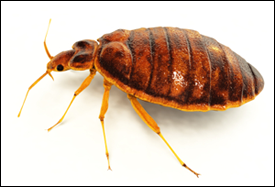 Bed bugs are flat, oval insects, with very short functionless forewings. The hindwings are absent. Their mouth parts are used for both piercing and sucking and are normally held under the body. They feed exclusively on blood.
Bed bugs are flat, oval insects, with very short functionless forewings. The hindwings are absent. Their mouth parts are used for both piercing and sucking and are normally held under the body. They feed exclusively on blood.
The adult bed bugs are approximately 5mm long, reddish brown in colour, becoming purple after feeding. They have well developed antennae, prominent simple eyes and clawed feet which enables them to climb rough but not smooth surfaces.
The close association of bed bugs with human beings means that they can cause substantial nuisance through their blood feeding habits. They feed during the night on human hosts as they are sleeping.
Iron deficiency in infants has resulted from excessive feeding by bed bugs. The bite often gives rise to a hard, whitish swelling which distinguishes it from the flea bite, which leaves a dark red spot surrounded by a reddened area.
The nuisance and itching caused by the bites and the possibility of secondary infection is more common.
Bed bugs are not regarded as disease carriers, but their blood feeding can cause severe irritation in some people, resulting in loss of sleep, lack of energy and listlessness, particularly in children.
Different individuals react differently to bites, some gaining immunity.
In the modern world, many factors are helping to sustain existing bed bug populations. Modern building techniques and the increase use of central heating, wall to wall carpets, loft and cavity wall insulation allows continued feeding and proliferation during winter. In addition the movement of second hand furniture and books, which has increased with the introduction of car boot sales, and their distribution maintains population levels.
Roaches
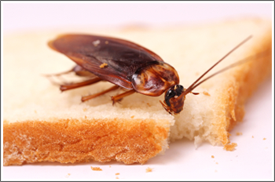 DID YOU KNOW? The cockroach poses one of the greatest health hazards of all household and commercial pest in NJ. Millions of them live in our homes, restuarants, and hotels spreading diseases and even causing food posioning. Pest-Gone, LLC has over two decades of experience in roach control and roach extermination in NJ. We provide your home or business with effective and immediate roach extermination and roach control services. we pride ourselves in providing our customers with only the best pest control and roach removal service in NJ and will always make sure our customers our completly satisfied with our service. Pest-Gone, LLC uses the most eco-friendly roach control methods available and will keep your home or business free of cockroaches. We provide same day service and will customize a monthly maintenance program to prevent your NJ or home or business being infested with roaches again. All of our technicians are state licensed and experienced highly trained professionals providing all of our customers with superior pest control service. Let Pest-Gone, LLC pest control experts take care of your roach problem because even the cleanest home and businesses can become infested with cockroaches.
DID YOU KNOW? The cockroach poses one of the greatest health hazards of all household and commercial pest in NJ. Millions of them live in our homes, restuarants, and hotels spreading diseases and even causing food posioning. Pest-Gone, LLC has over two decades of experience in roach control and roach extermination in NJ. We provide your home or business with effective and immediate roach extermination and roach control services. we pride ourselves in providing our customers with only the best pest control and roach removal service in NJ and will always make sure our customers our completly satisfied with our service. Pest-Gone, LLC uses the most eco-friendly roach control methods available and will keep your home or business free of cockroaches. We provide same day service and will customize a monthly maintenance program to prevent your NJ or home or business being infested with roaches again. All of our technicians are state licensed and experienced highly trained professionals providing all of our customers with superior pest control service. Let Pest-Gone, LLC pest control experts take care of your roach problem because even the cleanest home and businesses can become infested with cockroaches.
Call Pest-Gone, LLC NJ Pest Control to speak to a Roach Control Professional today at 732-356-0024
“We Always Guarantee our Work”
Please read below to learn more about Roach Control in NJ:
Cockroaches are a nocturnal insect. They are primarily active at night, often seen scattering as you turn on a kitchen light. They remain hidden in dark secluded harborages during the daylight hours. If you see some during the day, it is a sure sign that a tremendous population exists. Cockroaches are scavengers with a wide choice of food. They thrive on the same food humans eat and pollute human food in process of feeding. Cockroaches carry disease organisms on the loins and bristles on its body, as well as the sticky pads on its feet. The ability of cockroaches to transmit diseases seems to be highly over-rated, but they are mechanically capable of spreading some disease organisms such as the dysentery bacteria. Roaches will defecate on food and transmit staphylococcus, streptococcus and E. Coli. bacteria, which are very much a health hazard to humans. Cockroaches are considered general feeders-just about anything organic can become their next meal. They are especially fond of any food crumbs that are left behind, so good basic housekeeping is one real deterrent. The American Cockroach is usually the one seen when people brag about some "huge" roach they spotted. It can reach a body length of around two inches, and occasionally more. It has a reddish-brown color. The American cockroach lives in city sewer systems, ship holds, basements, and commercial food preparation areas. Life Cycle The female lays an egg case, containing about 15 eggs, near a food source. They also need to be left in a warm, damp environment. One egg case can be produced every week. The eggs hatch in 32-58 days, and then go through up to thirteen instars. The life cycle is an average of 600 days, with most adults living well over a year. Some have lived for almost four years!
Ants
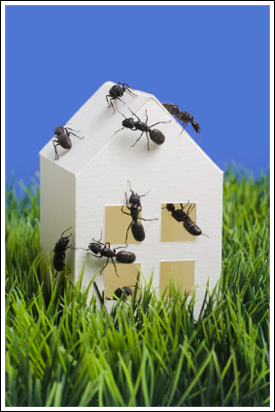 If you see a couple ants in your home, chances are good that there is a lot more. You could have hundreds if not thousands throughout your home before you realize you have a ant control problem. At the first sign of ants or carpenter ants in your home, call Pest-Gone, LLC pest control in NJ and allow one of our highly trained technicians assist you in taking care of your pest concerns.
If you see a couple ants in your home, chances are good that there is a lot more. You could have hundreds if not thousands throughout your home before you realize you have a ant control problem. At the first sign of ants or carpenter ants in your home, call Pest-Gone, LLC pest control in NJ and allow one of our highly trained technicians assist you in taking care of your pest concerns.
Pest-Gone, LLC pest control in NJ provides ant control services with a high level of expertise and experience in ant and carpenter ant control and ant removal services in NJ. Whether it's your NJ home or business, Pest-Gone, LLC will provide you a detailed inspection and any necessary ant or carpenter ant treatment needed to resolve your problem. With our eco-friendly and effective ant removal service, your NJ home or business will be free of any ant or carpenter ant problems.
-We offer 24 Hour Response Services (M-F) for any ant or carpenter ant control issue you may have with appointment times that are convenient for you.
-Our friendly and knowledgeable local technicians, ensure your family and pets the highest level of safety while treating your property.
-Call Pest-Gone, LLC NJ Pest Control to speak to an Ant and Carpenter Ant Professional today at 732-356-0024
"We Always Guarantee our Work"
Please read below to learn more about ant and carpenter ants in NJ
Ants vary greatly in size, from less than 1/16th of an inch to over an inch in the various species. They are almost all either black, brown, or reddish in color. They are different from most other insects in that they have a distinctly "elbowed" antenna. Ants have a highly developed, very complex social structure. There is a worker class, usually made up of sterile females, and a reproductive class consisting of both males and females with wings. A few also have a soldier class. They live in colonies, usually found either underground or in dead wood, but may adapt to other habitats. Seasonally the winged males and females emerge from the colony to reproduce-the males then die, and the females go on to form a new colony. Workers obviously have the task of doing the work of the colony-gathering food, tending to the eggs, larvae, and pupa, and defending the nest.
Most ants are considered either scavengers or predators, however there are types that are harvesters, gathering seeds from plants or tending aphids to obtain their sweet, sticky secretions. Many ants are capable of biting or stinging people. Ants have the ability to communicate, and can even learn simple tasks. They communicate both by touch (tapping the antennas), and by leaving a chemical odor trail. The odor trail usually marks a path between the nest and a food or water source. Argentine Ants have spread rapidly because they are friendly to other colonies, unlike other ants. All ants in the United States are fortunate because they have no natural enemies-so they can spread wherever they wish.
Termites
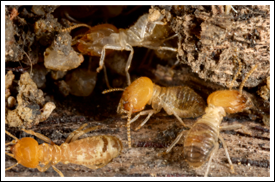 Termites cause more damage each year than fire, floods, and storms combined making termite control in NJ a top priority for any home or business owner. With over two decades of experience in termite removal in NJ, Pest-Gone, LLC provides top quality pest and termite control in NJ for termites, carpenter ants, and other wood destroying insects. At Pest-Gon, Inc., our Termite removal service provides a valid termite inspection and termite treatment in NJ with our gold seal warranty- giving you complete peace of mind.
Termites cause more damage each year than fire, floods, and storms combined making termite control in NJ a top priority for any home or business owner. With over two decades of experience in termite removal in NJ, Pest-Gone, LLC provides top quality pest and termite control in NJ for termites, carpenter ants, and other wood destroying insects. At Pest-Gon, Inc., our Termite removal service provides a valid termite inspection and termite treatment in NJ with our gold seal warranty- giving you complete peace of mind.
Leaving a termite infestation untreated can lead to significant damage to your home or commercial property in the matter of months. Let the termite removal experts at Pest-Gon, Inc. provide to you a comprehensive termite inspection and termite treatment for your NJ property with just one simple call.
When you call, our termite control consultants will provide you with information that you can understand! We will explain the termite inspection, termite removal process, and the eco-friendly methods used to protect your home or commercial property. So don't let termites destroy your most important investment, call Pest-Gone, LLC termite treatment services today!
WE OFFER FREE TERMITE ESTIMATES!
Call Pest-Gone, LLC NJ Pest Control to speak to a Termite Pest Control Professional today at 732-356-0024
“We Always Guarantee our Work”
Please read below to learn more about Termite Control and Termite Treatment in NJ:
Size
Worker: 1/8 inch in length
Soldiers: body is similar to that of the worker with an elongated head with pincer-like mandibles.
Supplementary Reproductive: about an inch in length with no wings or very short non-functional wings
Primary Reproductive: about an inch in length, with four wings of equal size.
Color
Worker: light colored.
Soldier: light colored with brown head.
Supplementary Reproductive: light colored.
Primary Reproductive: dark brown/black
Primary Reproductive is the termites most often seen in the open. They are commonly referred to as "swarmers".
Behavior
This termite is known to have major swarms occurring in May and June, but small flights can occur at any time of the year. Swarming is the primary way the termite naturally spreads after it has been transported to a new area. Three elements are needed for swarming to be effective: 1) Proper food resources (cellulose and wood), 2) moisture, and 3) a physical niche.
As the colony grows, specialized castes are produced for the different tasks required. The first caste produced is the workers. The second caste produced is the soldiers. The third caste to appear is the reproductive. Two types, primary and supplementary, are produced in a Formosan subterranean termite colony. The two types have different functions. Primary reproductive swarm and start new colonies. They are called alates or swarmers. Although thousands of primary reproductive are produced each year, they all leave the nest. Primaries cannot become reproductive if they remain in their colony of origin. In a Formosan colony, the only primaries that reproduce are the original king and queen that started the colony. Supplementary reproductive can become reproductive only in the colonies in which they were born. They take over reproduction when the primary king or queen dies or becomes separated from the main colony.
Habitat
Subterranean termites live in colonies in the ground, building vertical tunnels that look like mud tubes above ground level so that they can search for food. Because Subterranean termites will die if exposed to air for an extended period of time, the tunnels provide protection from the open air allowing workers to carry food to the nest. Subterranean termites can form tunnels through cracks in concrete, so slab homes are not exempt from these termites. They need to stay in contact with the soil in order to survive, unlike Dry wood termites that only need low moisture.
Tips for control
There are several things a homeowner can do which can help in preventing termite infestations or make them easier to detect:
-Store firewood away from the house. Carefully inspect used lumber, furniture and other wooden articles for termite infestations.
-Make sure at least four inches of the foundation can be seen all around the homes. Siding should not extend into the soil. Mulch and soil should not be high enough to cover the siding.
-Make sure water drains away from the foundation. Accumulation of water next to the foundation is important for the survival of a termite colony next to a home. Rain gutters are ideal; however, the downspout should direct the water away from the house.
-Roof or plumbing leaks can allow termites to survive above ground in a house. These should be corrected as soon as possible.
-Paint will protect exposed wood against termites for about five years, and commercial pressure treated wood will provide longer lasting protection. Before painting, all cracks and crevices should be filled with putty or plastic wood.
-Certain woods are naturally resistant to termite attacks. Among these woods are redwood core, bald-cypress, mahogany and Spanish cedar. These types of wood will become susceptible after several years of weathering.
